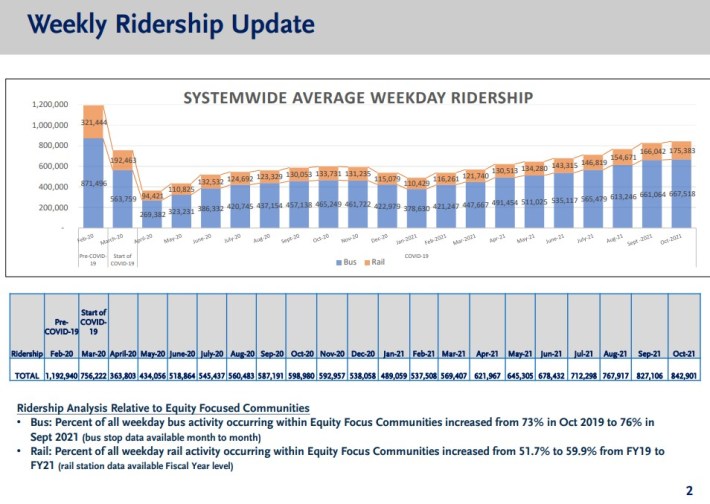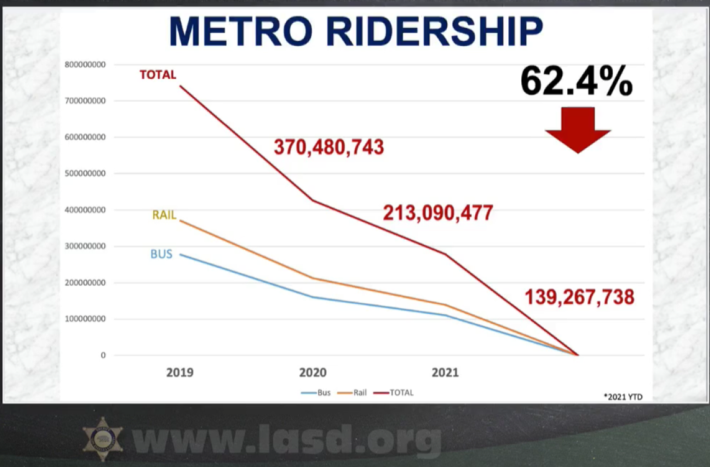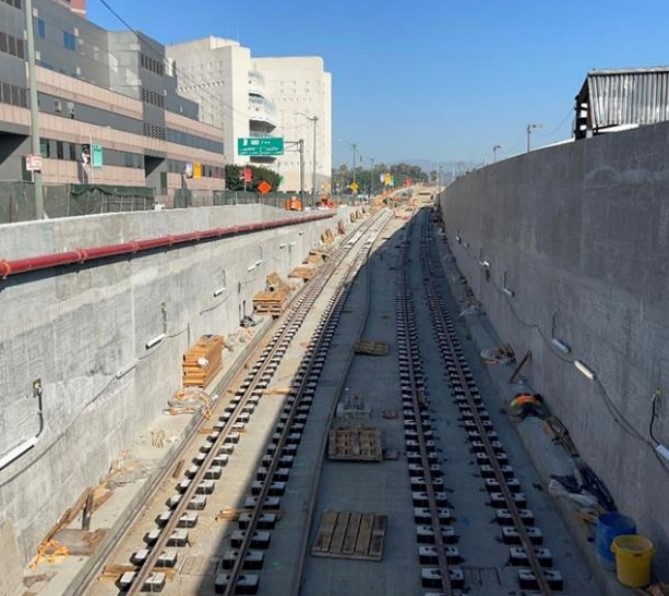Yesterday, SBLA took a look back at some of the issues that shaped 2021. Today it's time for Streetsblog Editor Joe Linton to make some bold predictions for 2022!
My predictions:
As COVID is Managed, Transit Ridership Rebounds
That pesky coronavirus won't be going away any time soon. Hopefully reasonable public health practices - vaccines, masks, etc. - make COVID fairly manageable.
Prediction: Metro transit ridership will rebound to pre-COVID levels in 2022.


Though 2021, Metro transit ridership trended upward. As service was restored and vaccinations provided some defense against COVID, weekday ridership rose from 489,000 (41 percent of pre-COVID) to 843,000 (74 percent).
There are various factors pushing ridership in various directions in 2021:
- Increasing ridership: Metro is restoring service cuts - continuing to hire operators to fully restore reliable service. Metro's student fareless pilot makes it easier for hundreds of thousands of youth to ride. Metro's low-income fare program is being made more effective, including offering free rides as an incentive to enroll. Metro is offering half-price passes for the next six months. Though it got off to a rocky start, Metro NextGen study changes - plus new bus lanes - should help facilitate improved bus service. Metro's new customer experience initiatives (including more outreach to the unhoused) could help make riding a bit more welcoming for all.
- Decreasing ridership: COVID cases are currently surging. Starting January 10, Metro will return to collecting bus fare (buses had been fare-free since the start of the pandemic). Metro's driver shortage has made for unreliable service. Construction (mostly for the Regional Connector subway - but also some Crenshaw/LAX) has closed portions of Metro rail lines.
All in all, I think that Metro CEO Stephanie Wiggins and Board Chair Hilda Solis will make good on their pledges to prioritize transit riders, and by the end of 2022 monthly ridership will rebound to at least the 1.2 million daily riders that Metro was seeing in 2019. Though that will be good news, Metro will still need to strive to continue to grow ridership. In Solis' words, Metro will return to pre-COVID ridership and "we won’t stop there."
New Bus Lanes
Prediction: New bus lanes will open on Alvarado Street and La Brea Avenue.
Dedicated bus-only lanes are, and will continue to be, among the most cost-effective, quick, and important tools for improving Southern California transit. Shepherded by L.A. City Councilmember and Metro Boardmember Mike Bonin, the collaboration between Metro and the L.A. City Transportation Department (LADOT) has already resulted in seven (!) new bus lane facilities in the past three calendar years. The new bus lanes will keep coming in 2022.
Planned bus lanes on La Brea Avenue will be installed this spring - 5.9 miles from Sunset Boulevard to Coliseum Street.
The remaining portion of the Alvarado Street bus lanes - between the 101 Freeway and Sunset Boulevard - stalled out in 2021. This street is officially a state highway, owned and managed by Caltrans. The project is all-too-slowly working its way through the Caltrans District 7 approval processes that were due to be finalized last October. By the end of 2022, I predict Caltrans will add the new bus lanes on Alvarado.
Opening of Regional Connector Subway
Prediction: The Regional Connector subway will open in late 2022.
According to Metro's original schedules, both the Regional Connector and the Crenshaw/LAX lines were supposed to be already open right now. Mega-project construction is unwieldy.
Barring some amazing developments, I don't expect Metro's problem-plagued Crenshaw/LAX line to open in 2022. Current projections suggest it could open mid-2022, but those keep getting pushed back, so my guess would be it opens early 2023.
November 2021 status report for LA Metro’s Regional Connector. 88.9% as of 11/26/21, +1.8% since 10/29/21. Project is behind schedule and report now says there is 4-5 months of schedule slippage. https://t.co/TV5JJFiGSg pic.twitter.com/bbJogN2hNh
— numble (@numble) December 24, 2021
But the downtown Los Angeles Regional Connector subway should.
According to the latest (November 2021) status report, construction is 88.9 percent complete, though still slipping a bit. What recently looked like an August/September opening now shows November 26. I am going to predict that Metro leadership will keep this one on track (pun intended) for a November 2022 opening. Reserve your commemorative TAP card asap.
Metro Transit Policing Reform
Prediction: Metro will shift some resources away from armed transit policing.
Metro is nearing the end of a year-plus long process to reimagine public safety on its trains and buses. One way to tell that things are indeed changing is that Sheriff Alex Villanueva is vocally criticizing Metro's board, staff, committees, etc. With Villanueva (in Bonin's characterization) highly effective arguments for reimagining policing, and the majority of the Metro board in support of reform, 2022 will see a new transit security regime approved, including more transit ambassadors and fewer armed officers. Armed police won't completely go away - and the current contracted agencies won't take these sorts of changes quietly - but the shift will benefit transit riders.
Elections
Prediction: At least three new Metro boardmembers will be sworn in in 2022.
2022 elections are too far off to make at this time. By this time next year there will be a new L.A. mayor, new L.A. city councilmembers, and more. This means plenty of change at Metro as the mayor controls four seats on the board. Currently these seats are held by Mayor Eric Garcetti, Mike Bonin, Jacqueline Dupont-Walker, and Paul Krekorian.
With Garcetti likely leaving for India soon, there could well be an interim mayor - before the November 8, 2022, election picks the next mayor. Expect plenty of turnover on the Metro board, and L.A. voters - make sure you vote for the candidate you want to see leading Metro.
Infrastructure
Prediction: Metro and Caltrans will put federal infrastructure dollars toward L.A. County freeway widening projects.
There have been a lot of pronouncements that Metro and Caltrans are backing off from the worst racist and most environmentally destructive highway projects. Whew.
Some of these changes are new policies; for examples, see Caltrans' brand new complete streets policy and Metro's recent affirmation that sales tax highway funds can go to multi-modal projects. Some internal shifts are promising too, with CEO Stephanie Wiggins reorganizing Metro's Highway Program.
But...
There are still a lot of old school highway builders (exhibit 1A: Metro Senior Executive Officer Abdollah Ansari) calling the shots, and plenty of leaders willing to get behind one more harmful freeway widening project. A couple more lanes will no doubt finally fix that bottleneck, right?
With the passage of President Joe Biden's $1.2 trillion infrastructure bill, there will be be lots of pressure to greenlight lots of infrastructure projects, including those highway widening projects that Metro and Caltrans say they're backing off of. Think of the jobs!
Sadly, I predict that in 2022 Metro and Caltrans will put federal infrastructure funding toward widening L.A. County freeways. And that advocates - for the environment, environmental justice, civil rights, housing - need to fight like hell to kill these projects.






